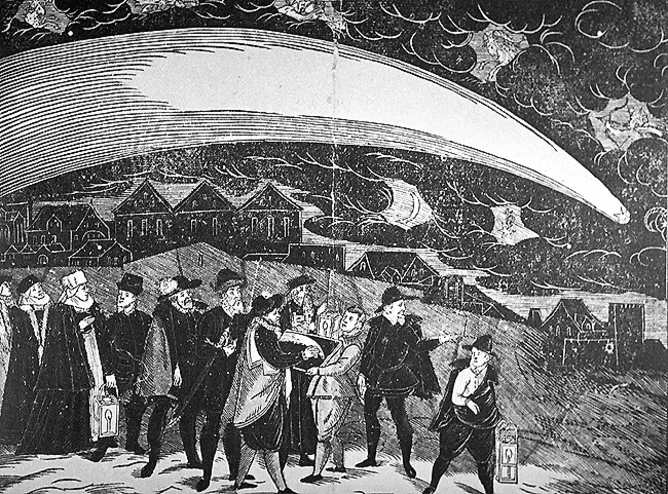The astronomer and the witch – how Kepler saved his mother from the stake

Ulinka Rublack, University of Cambridge
Johannes Kepler (1571-1630) is one of the world's most famous astronomers. He defended Copernicus's sun-centred universe and discovered that planets move in ellipses. A planet, NASA mission and planet-hunting spacecraft are named after him.
Yet in recent years Kepler and his family have appeared as dubious, even murderous people. In 2004 for example, a team of American journalists alleged that Kepler systematically poisoned the man he succeeded at the court of Rudolf II in Prague: Tycho Brahe. He may well be the scientist with the worst reputation.
But the majority of slurs concern the astronomer's mother, Katharina. Arthur Koestler's famous history of astronomy, The Sleepwalkers, where Katharina features as a "hideous little woman" whose evil tongue and "suspect background" predestined her as victim of the witchcraze.
Kepler, 1610.
Then there's John Banville's prize-winning historical novel Kepler, which vividly portrays Katharina as a crude old woman who makes a dangerous business of healing by boiling potions in a black pot. She meets with old hags in a kitchen infested with cat smells. Outside in her garden lies a dead rat. Kepler desperately tries to hide his mother's magical arts from his wife as they visit and Katharina searches for a bag filled with bat-wings. This horrendous mother is scary, disgusting, and probably a witch.
There is something behind these hints: the portrayals stem to the astonishing fact that 400 years ago, when her son was at the very height of his scientific career, Katharina Kepler was accused of witchcraft. It is because of this that it has become commonplace in Anglo-American writing to depict Kepler's mother as a difficult, bizarre and half-crazed old crone.
But what is the real story? Kepler certainly must rank as one of the most influential scientists to come from a disadvantaged background. Whereas Galileo's father was a noted scholar of music, Kepler's was a soldier who kept running away from the family. His parents argued and the only brother close to him in age suffered from epilepsy. This made it difficult for the brother to attend school or learn a trade.
Johannes Kepler, by contrast, soon emerged as an extremely talented boy. He was picked up by one of the most advanced Lutheran scholarship systems in Germany at the time and lived in boarding schools. He once fought against a boy who insulted his father, and was in his teens when the father disappeared for good.
Kepler's model of the solar system.
Kepler wrote bleak little characterisations of his parents and paternal family around the time that he finished university. He also wrote about himself as a flawed young man, obsessively interested in fame, worried about money, unable to communicate his ideas in a straightforward way. These pieces of writing have principally served as evidence who want to depict Kepler and his family as horrendous, even murderous.
Yet these writings need to be put into context. Kepler wrote them very early in his life, and he did so in order to analyse his horoscopes. The whole convention of astrology was to point to character problems, rather than to laud lovely people. Kepler was a deeply Christian man, and one of his most impressive characteristics is how optimistic he soon began to feel about the world he lived in, against his odds and despite looming war. He built his own family and deeply cared about his wife and children. Kepler was confident about the importance of his discoveries and productive, even though he was never offered a university position.
Statue of Katharina Kepler in Eltingen.
Harke, CC BY-SA
Then came the accusation against his mother. The proceedings which led to a criminal trial lasted six years. The Imperial mathematician formally took over his mother's legal defence. No other public intellectual figure would have ever involved themselves in a similar role, but Kepler put his whole existence on hold, stored up his books, papers and instruments in boxes, moved his family to southern Germany and spent nearly a year trying to get his mother out of prison.
Local records for the small town in which Katharina Kepler lived are abundant. There is no evidence that she was brought up by an aunt who was burnt for witchcraft – this was one of the charges which her enemies invented. There is no evidence either that she made a living from healing – she simply mixed herbal drinks for herself and sometimes offered her help to others, like anyone else. A woman in her late 70s, Katharina Kepler withstood a trial and final imprisonment, during which she was chained to the floor for more than a year.
Kepler's defence was a rhetorical masterpiece. He was able to dismantle the inconsistencies in the prosecution case, and show that the "magical" illnesses for which they blamed his mother could be explained using medical knowledge and common sense. In the autumn of 1621, Katharina was finally set free.
Johannes Kepler and his mother lived through one of the most epic tragedies in the age of the witch-craze. It's high time to re-evaluate what kind of man Kepler was: he does not deserve to be the scientist with the worst reputation. And nor does his mother deserve to be portrayed as a witch.
The Astronomer And The Witch by Ulinka Rublack is published by Oxford University Press on October 22.
Ulinka Rublack, Professor of Early Modern European History, University of Cambridge
This article was originally published on The Conversation. Read the original article.
© Copyright IBTimes 2025. All rights reserved.
























